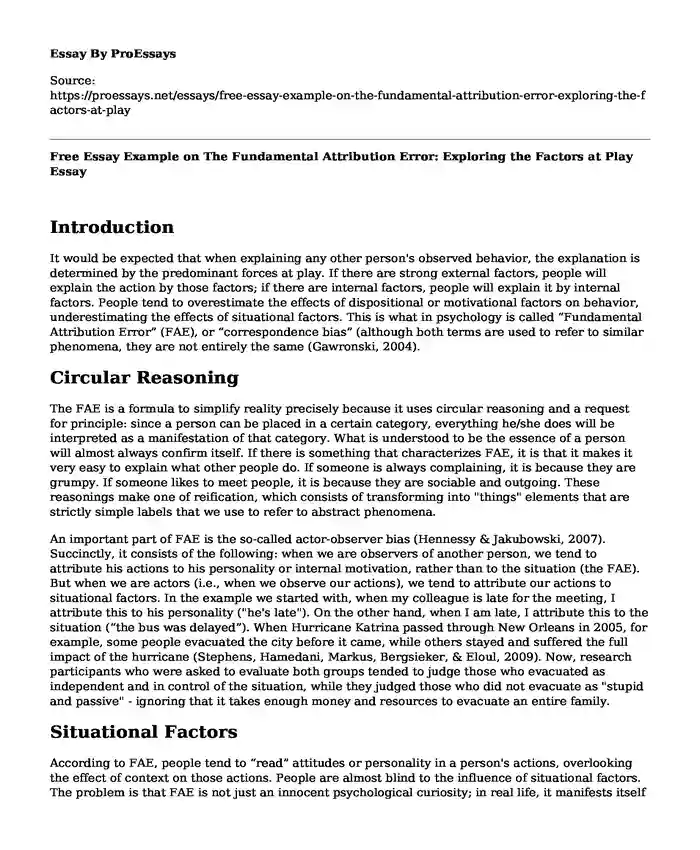Introduction
It would be expected that when explaining any other person's observed behavior, the explanation is determined by the predominant forces at play. If there are strong external factors, people will explain the action by those factors; if there are internal factors, people will explain it by internal factors. People tend to overestimate the effects of dispositional or motivational factors on behavior, underestimating the effects of situational factors. This is what in psychology is called “Fundamental Attribution Error” (FAE), or “correspondence bias” (although both terms are used to refer to similar phenomena, they are not entirely the same (Gawronski, 2004).
Circular Reasoning
The FAE is a formula to simplify reality precisely because it uses circular reasoning and a request for principle: since a person can be placed in a certain category, everything he/she does will be interpreted as a manifestation of that category. What is understood to be the essence of a person will almost always confirm itself. If there is something that characterizes FAE, it is that it makes it very easy to explain what other people do. If someone is always complaining, it is because they are grumpy. If someone likes to meet people, it is because they are sociable and outgoing. These reasonings make one of reification, which consists of transforming into "things" elements that are strictly simple labels that we use to refer to abstract phenomena.
An important part of FAE is the so-called actor-observer bias (Hennessy & Jakubowski, 2007). Succinctly, it consists of the following: when we are observers of another person, we tend to attribute his actions to his personality or internal motivation, rather than to the situation (the FAE). But when we are actors (i.e., when we observe our actions), we tend to attribute our actions to situational factors. In the example we started with, when my colleague is late for the meeting, I attribute this to his personality ("he's late"). On the other hand, when I am late, I attribute this to the situation (“the bus was delayed”). When Hurricane Katrina passed through New Orleans in 2005, for example, some people evacuated the city before it came, while others stayed and suffered the full impact of the hurricane (Stephens, Hamedani, Markus, Bergsieker, & Eloul, 2009). Now, research participants who were asked to evaluate both groups tended to judge those who evacuated as independent and in control of the situation, while they judged those who did not evacuate as "stupid and passive" - ignoring that it takes enough money and resources to evacuate an entire family.
Situational Factors
According to FAE, people tend to “read” attitudes or personality in a person's actions, overlooking the effect of context on those actions. People are almost blind to the influence of situational factors. The problem is that FAE is not just an innocent psychological curiosity; in real life, it manifests itself constantly and in a very harmful way. For example, this bias occurs when explanations based on the victim's personality traits or motivations are given in the face of a situation of abuse or abuse. Faced with negative events, the tendency to blame is encouraged by the tendency to see people before the environment as the predominant force behind harmful events. In other words, when something unwanted happens, it is easier to consider that it is due to the victim's personality (rather than unavoidable circumstances). When this happens, the victim may start having counterfactual thoughts. Activation of counterfactual thoughts occurs when one fails to meet an established goal, and follows a pattern of reasoning that specifies what would have had to happen to accomplish that goal (Broomhall & Phillips, 2018). Thus, when faced with a negative result in a given situation, the counterfactual simulation of an alternative hypothetical scenario allows comparing different possibilities of the same event and establishing causal links that may be useful to face similar future contingencies. Playing through fictional scenarios triggers negative feelings in people, such as remorse for mistakes made.
Conclusion
There are many explanations for the FAE but there is no consensus regarding its cause. It is easier to be insensitive to someone (or to oneself) when the actions are attributed to personal traits. FAE also blinds us to situation factors that could help us modify behavior. FAE’s solution is to avoid judging people and putting oneself in the other person’s place while searching for an explanation of their behavior.
References
Broomhall, A. G., & Phillips, W. J. (2018). Self-referent upward counterfactuals and depression: Examining regret as a mediator. Cogent Psychology, 5(1), 1416884.
https://www.researchgate.net/publication/322569900_Self-referent_upward_counterfactuals_and_depression_Examining_regret_as_a_mediator
Gawronski, B. (2004). Theory-based bias correction in dispositional inference: The fundamental attribution error is dead, long live the correspondence bias. European review of social psychology, 15(1), 183-217. https://www.researchgate.net/publication/281179007_Fundamental_Attribution_Error
Hennessy, D. A., & Jakubowski, R. (2007). The impact of visual perspective and anger on the actor-observer bias among automobile drivers. Traffic injury prevention, 8(2), 115-122. https://www.researchgate.net/publication/6333596_The_Impact_of_Visual_Perspective_and_Anger_on_the_Actor-Observer_Bias_Among_Automobile_Drivers
Stephens, N. M., Hamedani, M. G., Markus, H. R., Bergsieker, H. B., & Eloul, L. (2009). Why did they “choose” to stay? Perspectives of Hurricane Katrina observers and survivors. Psychological Science, 20(7), 878-886. https://psycnet.apa.org/record/2009-10633-014
Cite this page
Free Essay Example on The Fundamental Attribution Error: Exploring the Factors at Play. (2023, Oct 04). Retrieved from https://proessays.net/essays/free-essay-example-on-the-fundamental-attribution-error-exploring-the-factors-at-play
If you are the original author of this essay and no longer wish to have it published on the ProEssays website, please click below to request its removal:
- How Human Trafficking Victims Can Get Help and Treated to Cope With Trauma After Being Rescued
- OCD: Anxiety, Unpleasant Thoughts and Repetitive Behaviors - Essay Sample
- Axel's Autism: Challenges & Solutions for the Saunders Family - Essay Sample
- Essay Example on One Is Too Many: Understanding Military Suicide Rates
- Essay on Re-Designing Wards at McLean Hospital to Reduce Aggression in Mental Illness Patients
- Paper Example on One Week of Silence: A Life-Changing Mental Therapy
- Alcohol Abuse Among Teens: Adverse Effects on Health & Future - Report Sample







